Close
Close is an all-in-one high-performance CRM for growing sales teams and turning more leads into revenue.
Data integration: Skyvia supports importing data to and from Close, exporting Close data to CSV files, replicating Close data to relational databases, and synchronizing Close data with other cloud apps and relational databases.
Backup: Skyvia Backup does not support Close backup.
Query: Skyvia Query supports Close.
Establishing Connection
To create a connection to Close, select the authentication type and provide the required credentials.
Getting Credentials
API Key
-
Log in to Close and click Settings on the left.
-
Select API Keys.
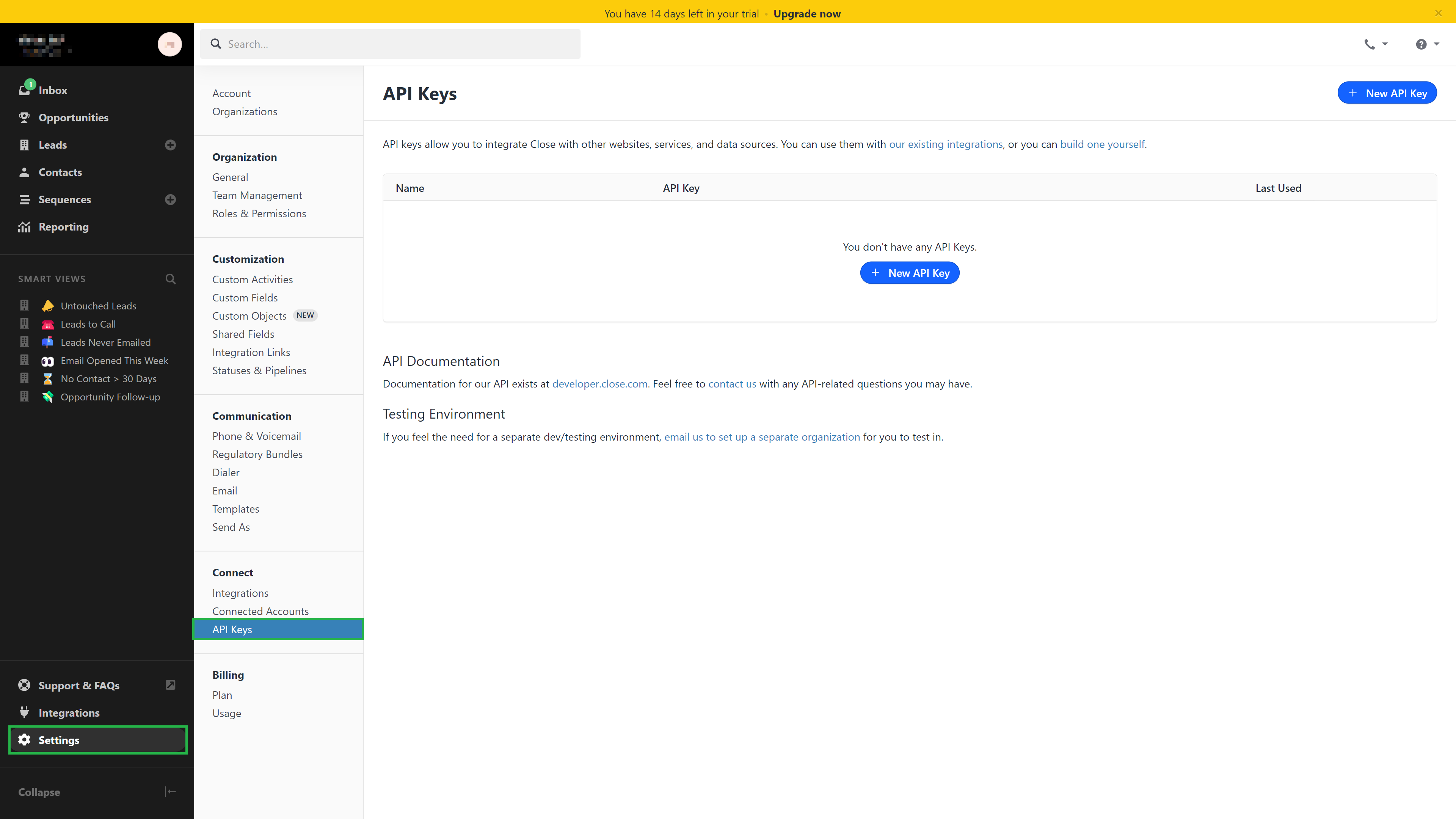
-
Click + New API Key.
-
Enter the API Key name and click Create API Key.
-
Copy the newly created API Key into the clipboard and click OK.
The API Key is available only once when you create it. Copy the displayed API Key and store it somewhere safe.
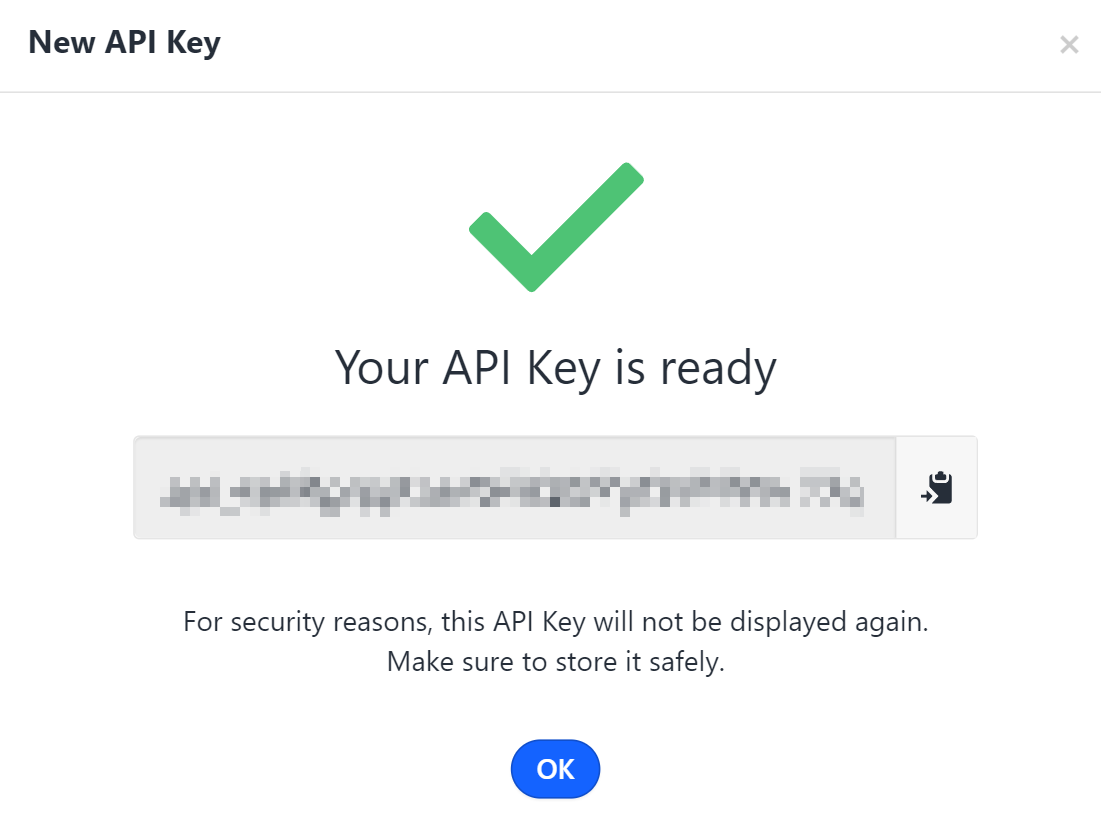
Creating API Key Connection
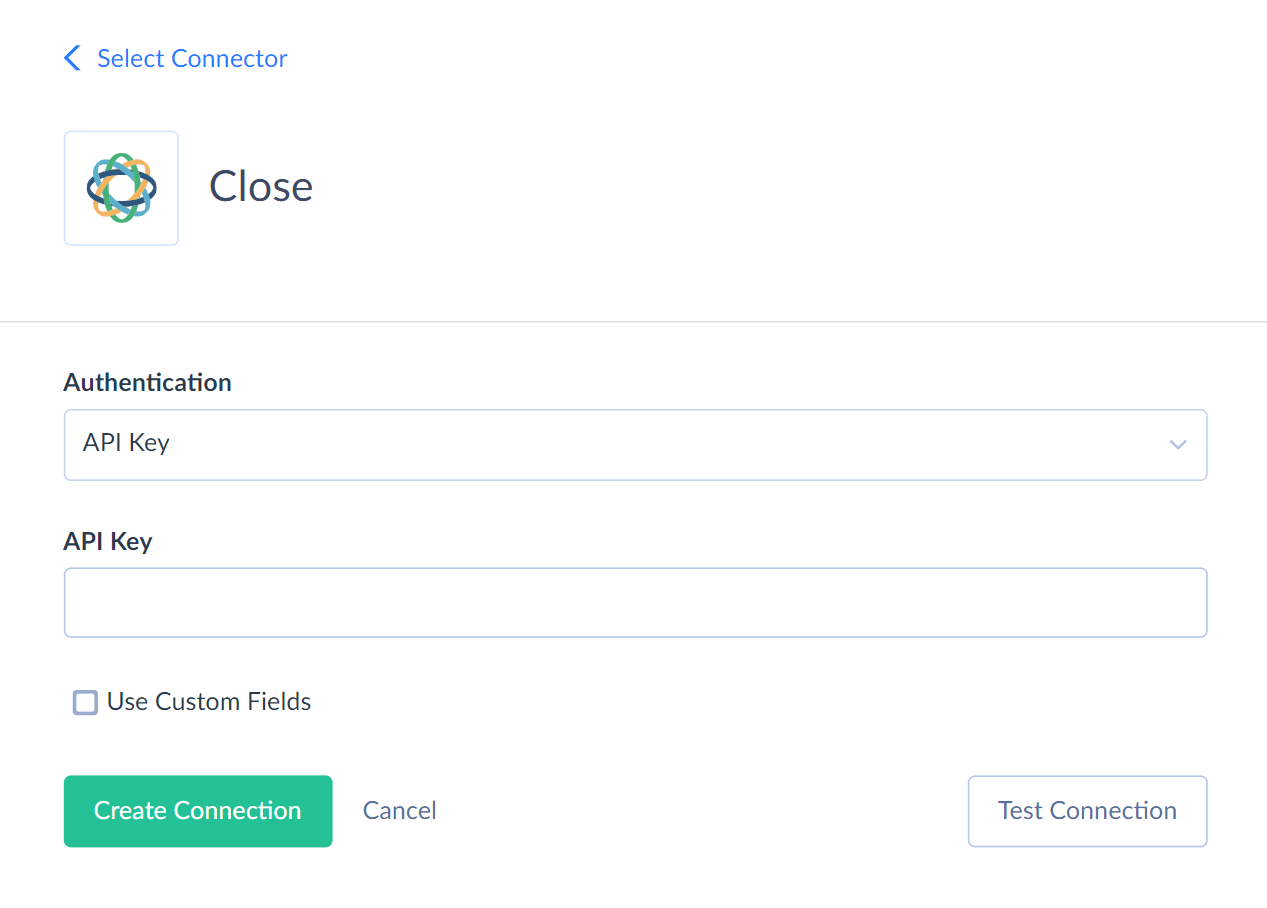
- Select the API Key authentication type.
- Enter the obtained API Key.
Creating OAuth Connection
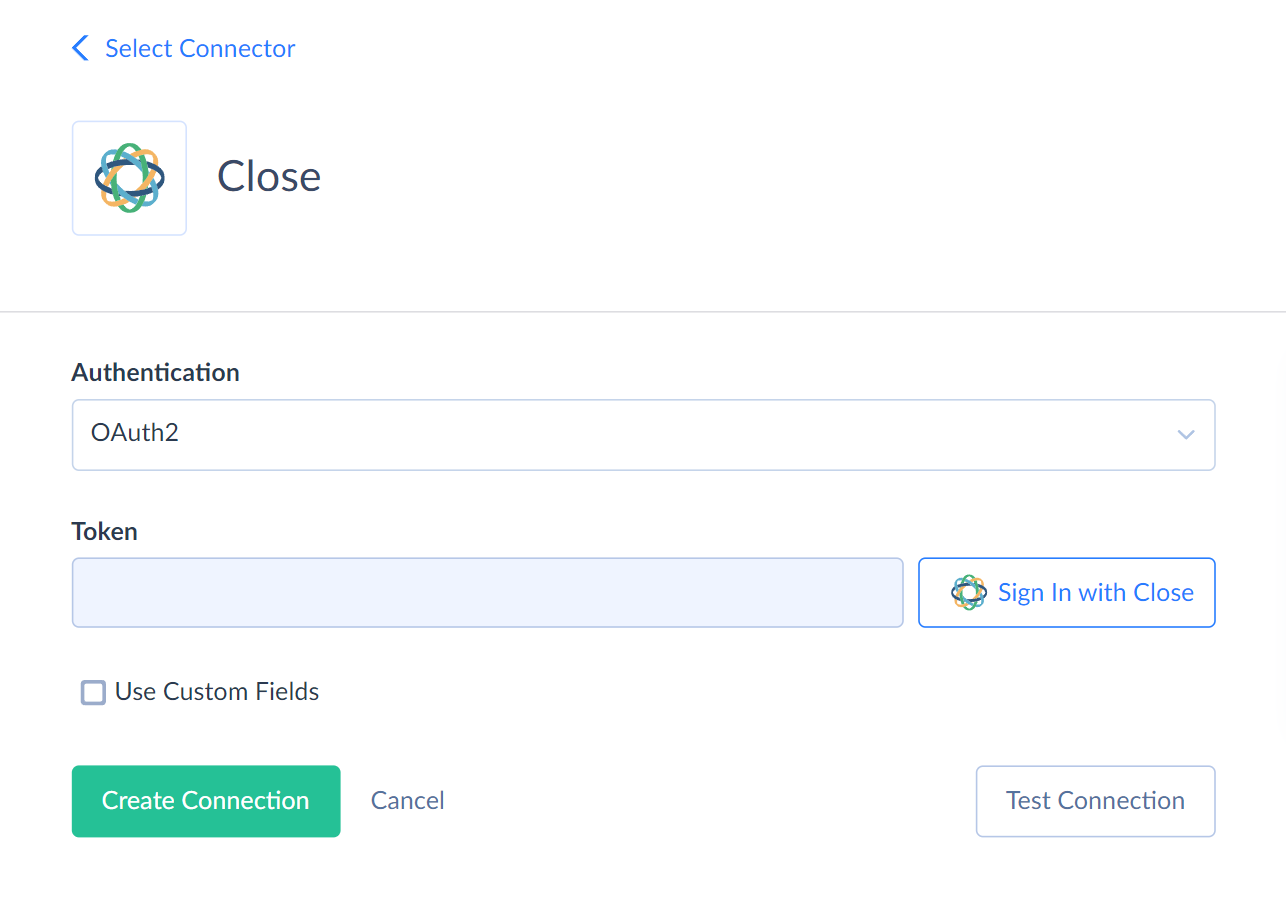
-
Select the OAuth2 authentication type and click Sign In with Close.
-
Enter your email and password.
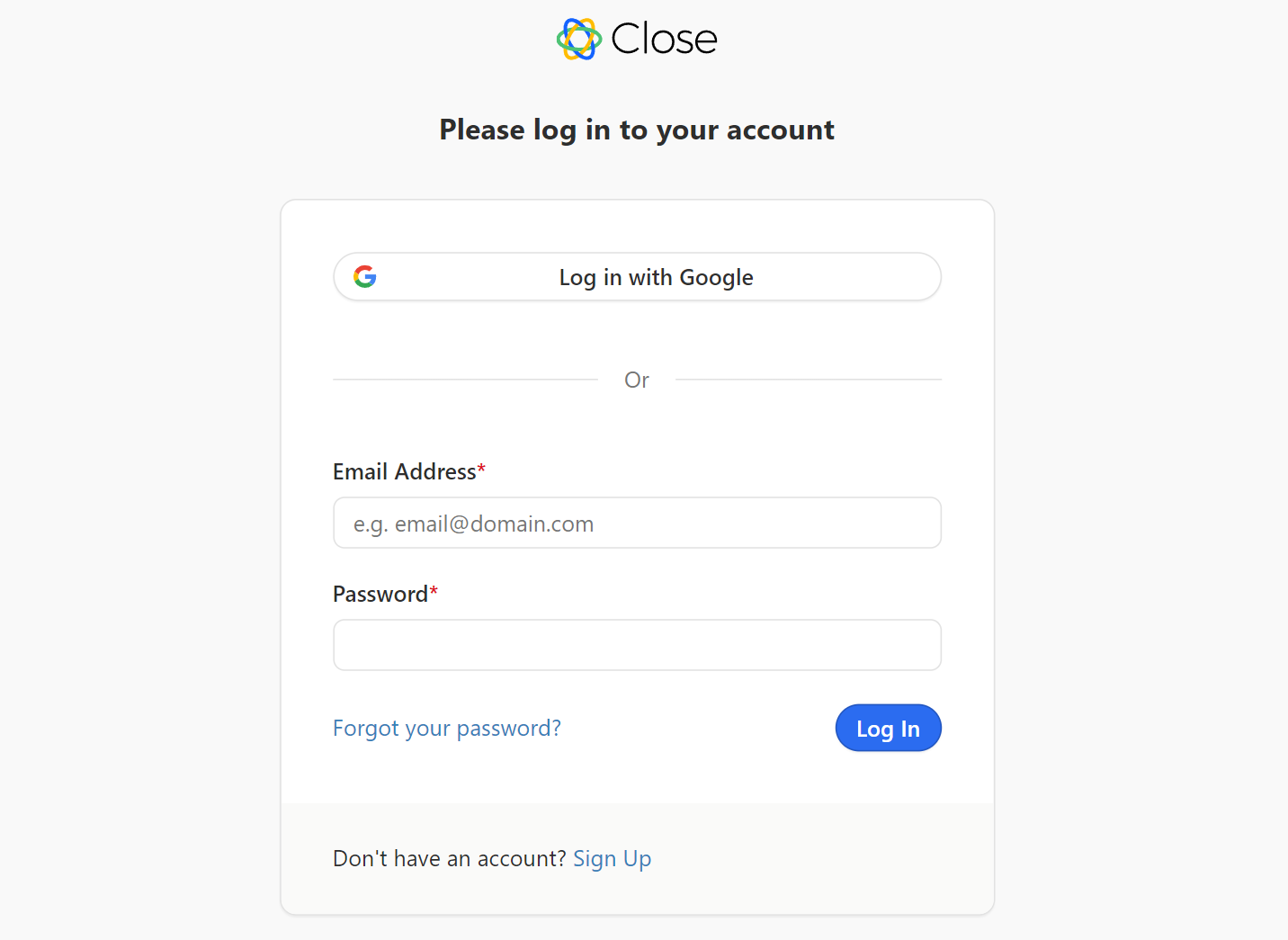
-
Allow Skyvia access your Close organization.
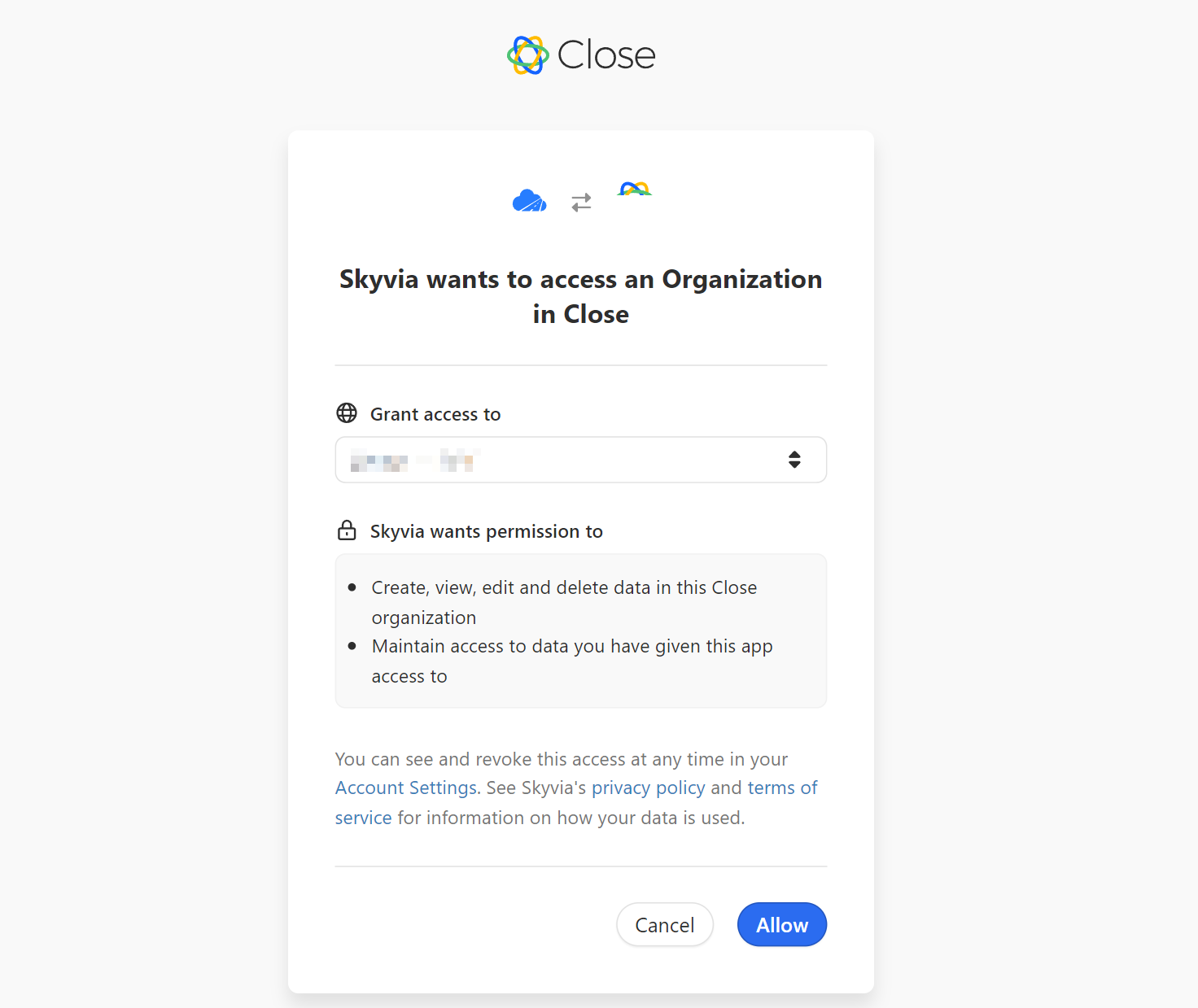
Additional Connection parameters
Use Custom Fields
Select this checkbox to make Close custom fields available in Skyvia.
Connector Specifics
Object Peculiarities
CustomActivityInstances
Close users can create custom activities of the specific type. The list of custom user activities is stored in the CustomActivityInstances object. Skyvia creates a separate object for every custom activity type, because every activity type has its own set of custom fields. For example, if the user has two custom activity types ActivityType1 and ActivityType2 Skyvia will create the ActivityType1_CustomActivityInstances and ActivityType2_CustomActivityInstances objects. These objects will contain fields available in the CustomActivityInstances and custom fields unique for every specific activity type.
For better performance, use filters by the CustomActivityTypeId and LeadId fields when querying. More information about the custom fields is available below.
Filtering Specifics
Close supports the following native filters:
| Object | Fields (Operators) |
|---|---|
| Activities | LeadId (=), CreatedDate (>=, <) |
| Contacts | Name (=), Description (=), StatusId (=, IN), OrganizationId (=, IN), Url (=), CreatedBy (=, IN), UpdatedBy (=, IN), CreatedDate (<, <=, >, >=), UpdatedDate (<, <=, >, >=) |
| CustomActivityInstances and *CustomActivityInstances | OrganizationId (=, IN), Status (=, IN), Type (=), UserId (=, IN), LeadId (=, IN), CustomActivityTypeId (=, IN), CreatedBy (=, IN), UpdatedBy (=, IN), CreatedDate (<, <=, >, >=), UpdatedDate (<, <=, >, >=) |
| Leads | Name (=), Title (=), LeadId (=, IN), OrganizationId (=, IN), CreatedBy (=, IN), UpdatedBy (=, IN), CreatedDate (<, <=, >, >=), UpdatedDate (<, <=, >, >=) |
Incremental Replication and Synchronization
Skyvia supports Replication with Incremental Updates for all Close objects except: ConnectedAccounts, Groups, LeadStatuses, OpportunityAggregateValues, OpportunityStatuses, Pipelines, ReportActivityMetrics, SendAs, SequenceSchedules.
Skyvia supports Synchronization for such Close objects as ActivityCustomFields, ActivityEmails, ActivityNotes, ActivitySMS, ContactCustomFields, Contacts,CustomActivityInstances, CustomActivityTypes, EmailSequences, EmailTemplates, IntegrationLinks, LeadCustomFields, Leads, Opportunities, OpportunityCustomFields, Pipelines, Roles, SequenceSubscriptions, SharedCustomFields, SmartViews, Tasks.
DML Operations Support
Skyvia supports the following DML operations for Close objects:
| Operation | Object |
|---|---|
| INSERT, UPDATE, DELETE | ActivityCustomFields, ActivityEmails, ActivityNotes, ActivitySMS, Contacts, ContactCustomFields, CustomActivityInstances, CustomActivityTypes, EmailSequences, EmailTemplates,Groups, IntegrationLinks, LeadCustomFields, Leads, LeadStatuses, Opportunities, OpportunityCustomFields, OpportunityStatuses, Pipelines, Roles, SharedCustomFields, SmartViews, Tasks |
| INSERT, UPDATE | SequenceSubscriptions |
| INSERT, DELETE | ActivityCalls |
| INSERT | BulkDelete, BulkEdit, BulkEmails, BulkSequenceSubscriptions, Export, SendAs |
| DELETE | ActivityEmailThreads, ActivityMeetings, ActivityTaskCompleted |
| UPDATE | PhoneNumbers |
Stored Procedures
Skyvia represents part of the supported Close features as stored procedures. You can call a stored procedure, for example, as a text of the command in the ExecuteCommand action in a Target component of a Data Flow or in Query.
AddUserToGroup
To add a specific user to a group, use the command
call AddUserToGroup (:group_id, :user_id)
DeleteUserFromGroup
To remove a specific user from a group, use the command
call DeleteUserFromGroup (:group_id, :user_id)
Custom Fields
The following Close objects contain custom fields: Contacts, Leads, Opportunities, *CustomActivityInstances. Custom fields, support the INSERT and UPDATE operations.
The following custom field types are available in our Close connector.
| Close Type | DbType |
|---|---|
| Text | String. The default length is 1000 characters. The length increases to 4000 characters, if the field name is memo or note, contains the description, comment, notes, address, or ends with url, reason, or keywords. If the name contains content or html, its length increases to 2147483647 charachters. |
| Textarea | String |
| Dropdown | String. Enum field. Single or Multiple entries allowed. |
| Number | Double |
| Date | Date |
| DateTime | DateTime |
| Contact (Single) | String. Refers to the Contacts object. |
| User(Single) | String. Refers to the Users object. |
| Contact (Multiple) | Array of strings. Includes the Ids of related contacts. |
| User(Multiple) | Array of strings. Includes the Ids of related users. |
| Textarea | HTML markup field, for example value . This type is available in the *CustomActivityInstances. |
Contact custom fields (Single and Multiple) in the Leads object don't support the INSERT operation.
Supported Actions
Skyvia supports all the common actions for Close.
Troubleshooting
The skip you set is larger than the maximum skip for this resource (max_skip = N)
Close API allows to read a limited number of records in some objects. This limit may vary in different Close objects.
If you exceed this limit when running an integration, it fails with the error of type: "Integration failed: The skip you set is larger than the maximum skip for this resource (max_skip = N). Please refine your search query". N in the error message is the maximum allowed number of records depending on the object.
You can reduce the number of read records using native filters.